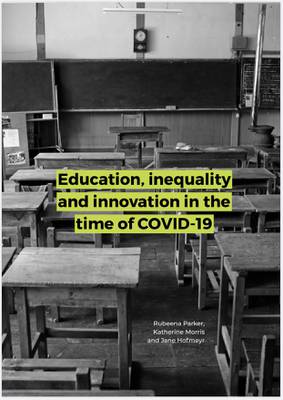Theme 9: Education, inequality and innovation in the time of COVID-19
INTRODUCTION
UNESCO reports that 87% of the world’s student population in over 160 countries is impacted by nationwide school closures instituted in response to the COVID-19 outbreak. In South Africa, the Minister of Basic Education, Angie Motshekga, echoed global responses and directed that all schools be closed from 18 March 2020. With the nation in its current state of lockdown until Thursday, 16 April 2020, it is unclear when schools are scheduled to reopen and ordinary education service provision is set to resume.
The Minister's announcement immediately affected nearly 13 million learners in primary and secondary ordinary and special schools, and nearly 1 million children in early childhood development centres and partial care facilities. Questions around continued curriculum delivery, and the safety, wellbeing and food security of learners and their families were immediately raised.
The DBE responded quickly by introducing and continuing to consider various interventions aimed at mitigating the effects of school closure on learners, teachers and parents, particularly as relates to curriculum delivery. The DBE introduced online learning materials to support learning at home during the lockdown period and along with various provincial education departments, was able to partner with television, radio and print media and telecommunications companies in respect of curriculum delivery and support.
School closures widen learning inequalities and disproportionately affect poor learners and those who experience barriers to learning. The extant crisis therefore necessitates and compels government to offer swift and effective solutions to address immediate challenges facing education amid COVID-19, and to quell the possibility of widening inequality. Over and above this, the COVID-19 crisis also presents an opportunity to develop innovative and sustainable solutions to address problems long characterising the education system, and to improve future education service provision.
RESEARCH PURPOSE/OBJECTIVES
This research is ultimately aimed at analysing existing interventions to address school closures, and also to identify best practises and possible sustainable solutions to be applied in the long-term to address inequalities in the education system beyond COVID-19.
Accordingly, this research will outline the impact of COVID-19 on the provisioning of education services, with a particular focus on the effect of school closures on learners and their families. It will examine existing and developing interventions proffered by government, other education stakeholders and other jurisdictions and, where possible, comment on the effectiveness of these interventions. A comparative study of interventions implemented in other jurisdictions in response to COVID-19 and similar crises will also be conducted, and their potential application within the South African context will be examined. Lastly, this research will identify best practices and possible sustainable solutions to address inequalities in the education system, even after schools reopen.
METHODOLOGY
The research will be qualitative and will result in an overview of existing or developing interventions in which learnings and a list of recommendations for current and potentially sustainable interventions for the future are presented.


